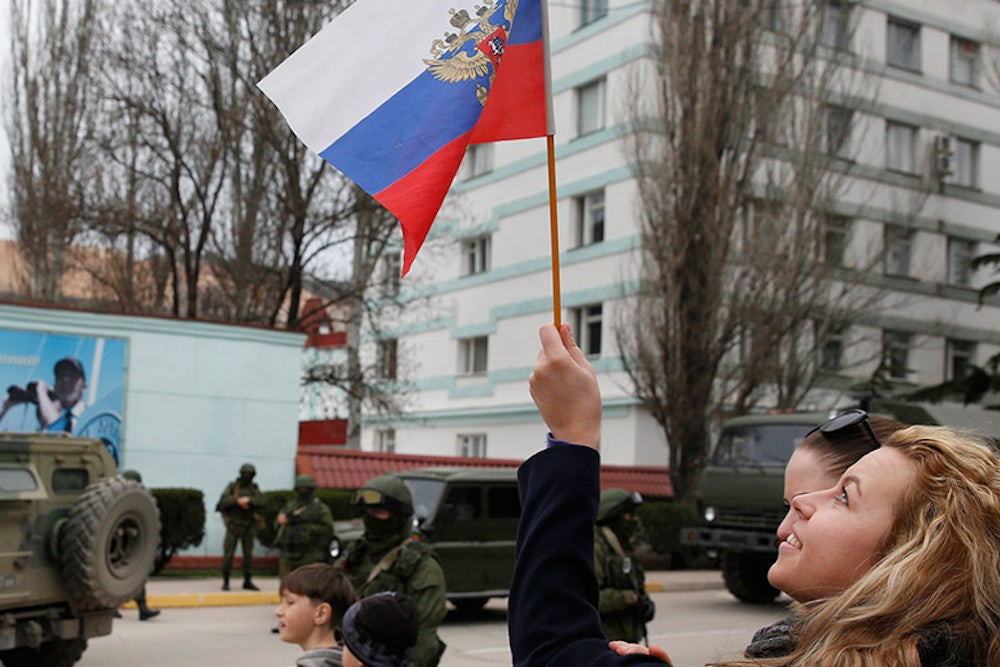It's easy to lose your mind in Russia, especially if you try to find a logic in the government's actions, especially in the realm of foreign policy. The more acute the situation, the closer insanity comes creeping in: before your eyes, black turns to white, blatant aggression is “peacekeeping,” and hostilities towards a sovereign state are depicted as noble deeds. And this is where we find ourselves today, as Russia finds itself on the brink of war with neighboring Ukraine.
What Russia is trying to accomplish in the Crimea is not clear even in the Kremlin, it seems. Over the last few days, I have carefully read all the statements made by Russian officials; I’ve spoken with many of them. I’ve heard dozens of explanations of Russia’s actions in the Crimea: the defense of military bases, the defense of Russian citizens, reacting to an untrustworthy new government in Kiev. And yet I couldn’t get a clear answer to the simple question of “why?” More and more, I find the Russian position on the Crimea resembles a mad dashing back and forth: Valentina Matvienko, the speaker of the Federation Council, who on Saturday had voiced support for sending Russian troops to Crimea, had completely rejected any possibility of armed conflict only days before. And over the course of the last three months, until just recently, the Russian Ministry of Foreign Affairs had strictly warned against any intervention in Ukraine by outside actors.
It’s enough to make your head spin, especially if you’re trying to think of it as of a coherent policy. But it isn’t. And there’s been no logic in it, either. When it comes to Ukraine, there hasn’t been any for years. Russia passively looked on as the most convenient Kremlin ally, ex-prime minister Yulia Tymoshenko, was sent to prison on fabricated charges, and continued to build a relationship with her jailer, Viktor Yanukovich. When he was ousted, Moscow dismissed him as having no authority, but right away granted him security guarantees on Russian territory and helped him organize a massive press-conference.
There is a Russian proverb: “To spite mom, I will freeze my ears off.” It refers to a child who won’t wear a hat in the cold simply for the sake of disobeying his mother. Russian foreign policy function exactly in this way: again and again, Moscow makes decisions that are most detrimental to Moscow itself. Elegantly juggling various principles of international law, the Russian government has been steadily spoiling its relations with its international partners.
What does it get in return? Problems on its own territory. Think of the reckless proclamations about the right of Crimea to self-determination: they may very well start echoing back from inside the country, from Kaliningrad, Tatarstan or the northern Caucasus, where separatist sentiment has never died down. Moreover, the Kremlin seems to have forgotten that Japan has a claim out for the Kuril Islands, and that a peace treaty has not yet to be signed with Tokyo. In other words, blinded by its desire to show itself a strong power with influence in the region, Russia is only putting itself in the crosshairs. “Don’t chop the branch you’re sitting on” is another Russian proverb.
A Russian invasion of Ukraine—if it ends up happening—will mean catastrophe, most of all for Russia. Paradoxically, it will only help Ukraine: Questions about the legitimacy of the new government in Kiev will fall away; the IMF and the West will be tripping over themselves to help Ukraine financially; this, in turn, will prop up the government in Kiev, which is currently broke; and, finally, the Ukrainian people will be united in their fight against an occupier—and isn’t this exactly the kind of unity you need after a revolution? Russia, on the other hand, will be left with international isolation and yet another neighboring territory recognized by no one. In 2008, it was Abkhazia and South Ossetia; now, it is the Crimea. But in acquiring the Crimea, Russia will lose Ukraine, its biggest partner for transporting gas to Europe.
It seems that the invasion of Ukraine is being done merely to remind the world about Russia and that it is a powerful regional player. But this is a game without an endgame. If Russian troops annex the Crimea or march further into eastern Ukraine, what will Russia do with this bounty? I doubt anyone in the Kremlin knows.
People who know Vladimir Putin well say that his place in history is of paramount importance to him. According to them, he considers one of his main accomplishments the 2007 unification of the Russian Orthodox Church and the Russian Orthodox Church Outside of Russia, which split from one another after the Bolshevik Revolution. And yet it seems that history teaches Putin nothing. The Russian-Georgian War of 2008 brought Russia nothing but zinc coffins and two impoverished nations that effectively became part of Russia.
But there are examples from more distant history, history that Vladimir Putin must know. In the middle of the 19th century, Russia also fought a war in the Crimea, against a British, French and Ottoman coalition. The war was a disaster for the Russian Empire. Nicholas I, the man who started the war, didn’t live to see its end. His throne was filled by Alexander II. He signed the Treaty of Paris and, out of the rubble of war, began the biggest liberalizing campaign in Russian history.
Tikhon Dzyadko is a deputy editor of DozhdTV, Russia's last independent television station.
Translated by Olga Zeveleva.
Stay informed with The New Republic's Ukraine Newsletter. Sign-up here.
